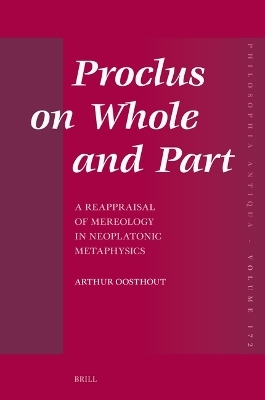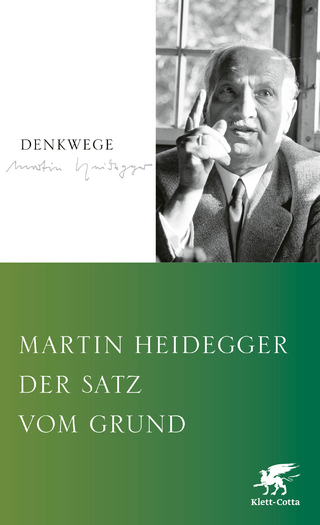
Proclus on Whole and Part: A Reappraisal of Mereology in Neoplatonic Metaphysics
Brill (Verlag)
978-90-04-72175-3 (ISBN)
- Noch nicht erschienen (ca. März 2025)
- Versandkostenfrei
- Auch auf Rechnung
- Artikel merken
No late ancient philosopher has written more extensively on part-whole relations than the Neoplatonic commentator Proclus. In Proclus on Whole and Part, Arthur Oosthout unfolds, for the first time, Proclus’ detailed and systematic analysis of (Neo-)Platonic mereology in full. Oosthout weaves together a great number of previously disconnected scholarly inquiries into Proclus, while adding many critical notes and new insights of his own. He bases this new synthesis on a detailed theoretical framework built not only on the metaphysical theories of Plato and Aristotle, but also on the arguments of prominent scholars of modern mereology.
Arthur Oosthout, Ph.D. (2022), is a researcher at the Institute of Philosophy of the KU Leuven who specialises in late ancient Neoplatonism. His publications include a contribution to the recent volume Longing for Perfection in Late Antiquity (Brill, 2023).
Acknowledgements
Figures and Tables
1 Introduction
1.1 Status Quaestionis
1.2 A Preview of Proclean Mereology
1.3 Overview of the Study
1.4 Essential Proclean Concepts and Terminology
1.5 Critical Editions and Translations
Part 1: The Mereological Question
2 Mereology 101
2.1 Classical Extensional Mereology
2.2 Davis Lewis’s Argument for Unrestricted Composition
2.3 Peter Van Inwagen and the Special Composition Question
2.4 The Whole as a Structure in Plato
2.5 Structure as a Part in Aristotle
2.6 The Two Sides of Modern Mereology
Part 2: The Central Tenets of Proclean Mereology
3 Quantity versus Complexity
3.1 Proclus’ Rule in the Elements of Theology
3.2 ‘A Being First, Then a Living Being’: the Proclean Rule in Action
3.3 Stacking Material Substrates: the Proclean Rule and Demiurgy
3.4 The Compatibility of the TP- and IP-Passages
3.5 The Double Meaning of Συνθετωτερον
4 A Wholesome Trinity
4.1 The Basics of the Threefold Wholeness
4.2 Whole above Part: the Roots of Proclean Mereology
4.3 Two Examples from Proclus’ Cosmology
4.4 The Whole in Each Part: a Reappraisal of Previous Readings
4.5 Stronger Apart and Stronger Together
Part 3: Part and Whole in Proclus’ Theology and Cosmology
5 Dividing the Indivisible
5.1 Balancing the Relativistic Whole and the Determinate Whole
5.2 The Distinctive Character of the Intelligible Whole
5.3 Unfolding the Heaven
5.4 The Evolution of Whole into Part
5.5 The Division of the Platonic Forms by the Intellective Gods
5.6 The Development of Axiology, Cosmology, and Perfection
5.7 The Indivisible Divided
6 Uniting the Imperfect
6.1 The Mereological Role of Time
6.2 Between a Systematic and an Exegetical Mereology
6.3 Material Existence and the Partial Wholeness of the Individual
6.4 The Question of the Partial Good
Part 4: Bringing the Parts Together
7 The Best Kind of Whole (for a Neoplatonist)
7.1 Reflecting on the Sum of the Parts
7.2 What Is Proclus’ Definition of the Whole(Some)?
7.3 Is Proclus’ Mereology Consistent?
7.4 Is the Proclean Whole Fuzzy or Fantastical?
7.5 Are Proclean Compounds Whole in an Ethical Sense?
7.6 Is Proclus’ Mereology Actually Any Good?
Bibliography
Index locorum
Index nominum
Index rerum
| Erscheint lt. Verlag | 27.3.2025 |
|---|---|
| Reihe/Serie | Philosophia Antiqua ; 172 |
| Verlagsort | Leiden |
| Sprache | englisch |
| Maße | 155 x 235 mm |
| Gewicht | 1 g |
| Themenwelt | Geisteswissenschaften ► Philosophie ► Metaphysik / Ontologie |
| Geisteswissenschaften ► Philosophie ► Philosophie Altertum / Antike | |
| ISBN-10 | 90-04-72175-4 / 9004721754 |
| ISBN-13 | 978-90-04-72175-3 / 9789004721753 |
| Zustand | Neuware |
| Haben Sie eine Frage zum Produkt? |
aus dem Bereich


